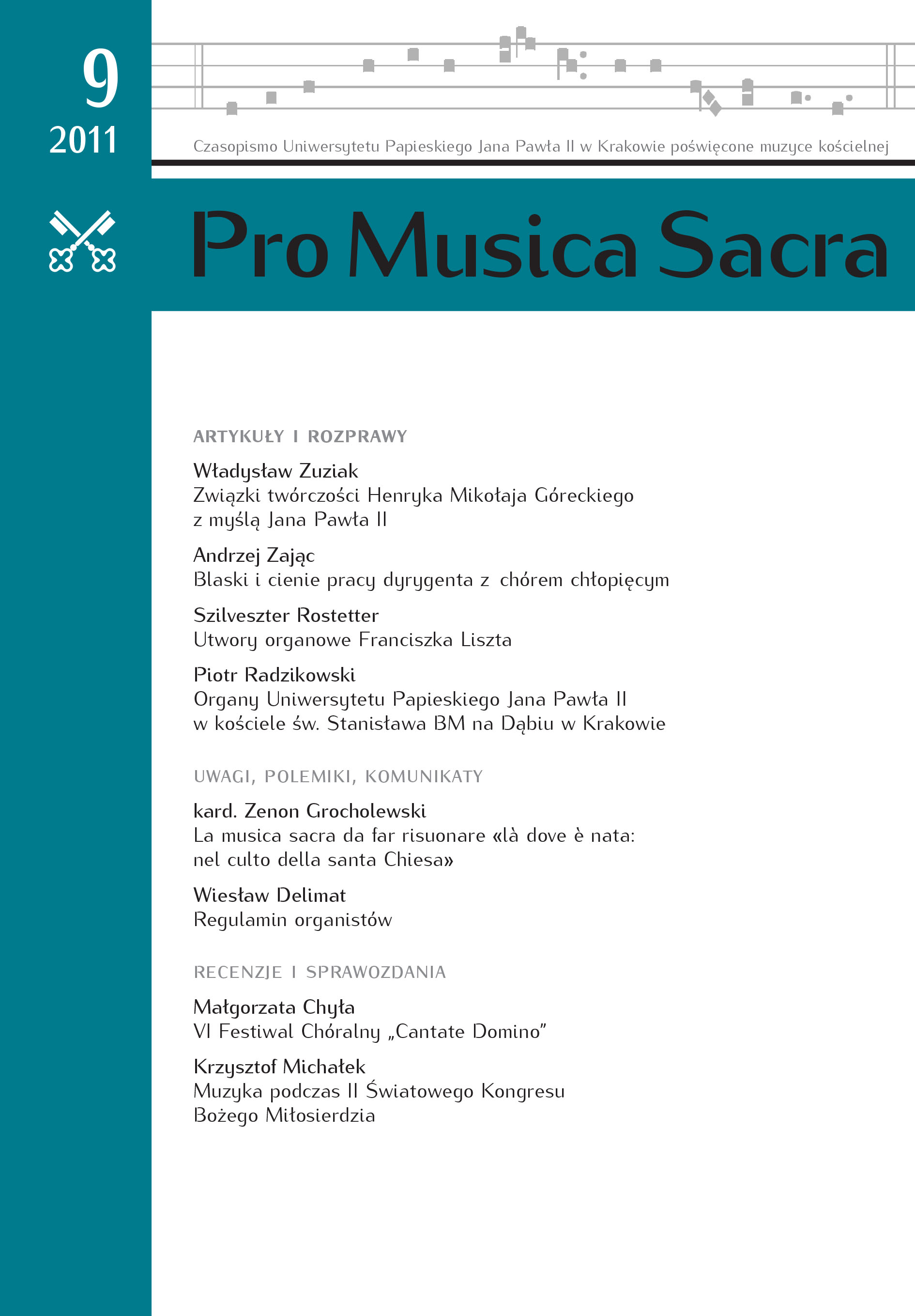Blaski i cienie pracy dyrygenta z chórem chłopięcym
DOI:
https://doi.org/10.15633/pms.904Abstrakt
In his article the author presents his own experience of working with the Boys Cathedral Choir „Pueri Cantores Tarnovienses” which he established and conducted at the Cathedral Basilica of Tarnow for the period of 27 years (1981-2008). The paper aims primarily at presenting the methodology specifically followed by the Tarnow choir, with particular focus on educational and formative aspects – as related to conducting the choir of the above type . The author renders the whole subject against the historical and aesthetic background. He emphasises the historical “rootedness” of boys choirs in the musical culture of Europe. The rootedness which, over the centuries, set the base for solidifying the great tradition of boys choral singing in Christian liturgy, regardless of denominational differences. This tradition is still living today, developing also beyond the sphere of Christian religions. Within the Catholic Church it has been realised through the activities of Pueri Cantores Federation. An aesthetic argument to justify an exceptional position of boys choral singing is, without doubt, a peculiar beauty of boys’ voices before puberty break. Therefore, a boys choir makes an ideal instrument for performing the old chorał music, especially that of the Renaissance and baroque periods. Within the methodology of conducting a boys choir, the author concentrates on the issues of establishing a choir, various ways of choristers’ recruitment, stressing the systematic exercises on voice production and featuring the qualities of a good voice production trainer. He also makes several comments on rehearsal arrangements. In his perceiving the boys choir as an educational milieu he accentuates the role of a choirmaster in three areas of his pedagogical and educational work, namely: education, schooling and formation. According to the author, only the whole composite of conductor’s activities to combine both historical and background of a choir, as well as, competent knowledge of conducting didactics, reliability and conscientiousness in meeting artistic aims can guarantee that the choir will achieve a high level of performance. And a living contact of choristers with the art of singing, sensibilising them to the beauty of music, building the sense of responsibility through a team work can help the choirmaster in his educational activities be the natural and indispensable parts of conducting boys choirs.
Pobrania
Opublikowane
Numer
Dział
Licencja
Prawa autorskie (c) 2011 Andrzej Zając

Utwór dostępny jest na licencji Creative Commons Uznanie autorstwa 4.0 Międzynarodowe.
Autorzy publikujący w czasopiśmie udzielają jego wydawcy zgody o następującej treści:
- Autor zachowuje autorskie prawa majątkowe do utworu, a jednocześnie udziela wydawcy czasopisma zgody na jego pierwszą publikację w wersji drukowanej i wersji online na licencji Creative Commons Uznanie autorstwa 4.0 Międzynarodowe oraz zgody na wykonywanie opracowań, w tym przekładów.
- Autor ma możliwość udzielania zgody niewyłącznej na opublikowanie utworu w wersji, która ukazała się w czasopiśmie (np. zamieszczenia go w repozytorium instytucjonalnym lub opublikowania w książce), wraz z informacją o jego pierwszej publikacji w czasopiśmie.
- Autor może umieścić swój utwór online (np. w repozytorium instytucjonalnym lub na swojej stronie internetowej) jeszcze przed zgłoszeniem utworu do czasopisma.

